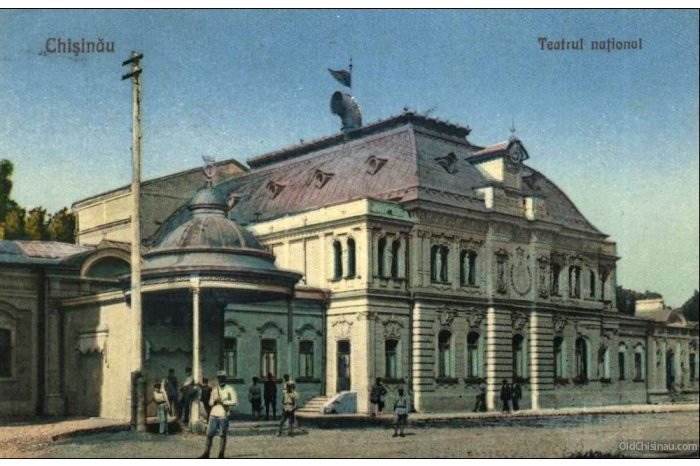Mihai Eminescu National Theatre of Moldova: 100th anniversary of foundation
09:25 | 22.02.2021 Category: Culture
Chisinau, 22 February /MOLDPRES/- The Mihai Eminescu National Theatre (TNME) will mark its 100th anniversary of the foundation as national theatre on 6 October. The institution’s creation was influenced by more initiatives coming from personalities of the Romanian culture, who organized diverse cultural actions. A people’s theatre worked in Chisinau on the period 1918-1921.
TNME director, People’s Artist Petru Hadarca, said that the 1918 year had been a hallucinating and terrible one. The war continued to bring suffering and death. In Russia, the revolution shook the Tsarist Empire completely. After declaring independence from the Russian Empire, the lawmakers from the Chisinau legislative body voted the Act of Union with Romania. It is difficult for us to presently imagine the conditions and atmosphere in which people were leading their lives – poverty, shortages, uncertainty of the future. And it is even more difficult for us to understand where those who dedicated themselves with body and soul to education and culture had energy and powers, as well as enthusiasm from. Namely at that time, a printing house with Latin letters was brought, summer courses of Romanian language were organized for teachers, Romanian books were brought and theatre was made in the Romanian language.
”In 1918 and 1919, theatres from Romania made tours not only to Chisinau, but also to Balti, Soroca, Cetatea Albă, Ismail. Nevertheless, the media from Chisinau, as well as from Bucharest was more and more insistently speaking about the need of a permanent Romanian theatre. Just in 1918, an actor from the Bucharest National Theatre, Constantin Marculescu, submitted a request to the Ministry, thereby asking to found a Romanian theatre subsidized by the state in Chisinau. At that time, the authorities hesitated to fulfill this approach. One year later, writer Dumitru Iov and an actor from Iasi, Mihail Popovici, set up the first troupe of professional theatre, the Romanian dramatic company of cultural propaganda in Bessarabia, for which they got also a small subsidy from the competent ministry of Bucharest; yet, after several months, the troupe broke up over lack of resources,’’ the TNME director noted.
According to Petru Hadarca, in 1920, a group of intellectuals and political figures from Bessarabia undertook more official approaches to create a Romanian theatre financed with public money in Chisinau. They set up an initiative group – the Leadership Artistic Committee of the People’s Theatre from Chisinau – and asked the Ministry of Cults and Arts from Romania to create the theatre in the region between the Dniester and Prut rivers. An official appeal was read also at a meeting of the Romanian Senate. These approached received a positive opinion. Thus, on 20 October 1920, the People’s Theatre from Chisinau, Institution privileged by state, started its season in Chisinau.
”This first season of a Romanian theatre in Chisinau, organized in the form of a People’s Theatre, maintained, to a great extent, from the enthusiasm of the organizers and artists, had controversial echoes in the public space. And in May 1921, Minister Octavian Goga came here on a working visit. The People’s Theatre ended its work after the first season on 19 May 1921. Nevertheless, culture and theatre people continued to speak out for the organization of a permanent theatre, with status of National Theatre, which would ensure it a constant support on behalf of the government. The theatre is an art of emotions and intelligence, which is experienced in reality and has power to wake up spirits and unite hearts,’’ Petru Hadarca said.

